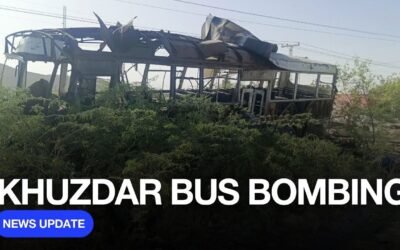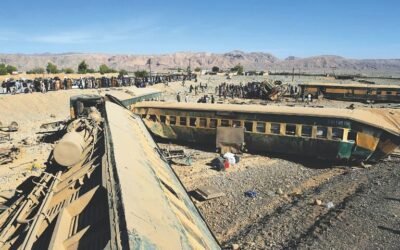The Balochistan rail blast Pakistan is the latest in a series of targeted attacks threatening the country’s already fragile internal security. On June 17, 2025, a powerful explosion ripped through a railway track in the Mach area of Balochistan, disrupting passenger and freight train services and injuring at least one railway worker. While no group has officially claimed responsibility, officials suspect the involvement of Baloch separatist elements, continuing a pattern of insurgency aimed at sabotaging national infrastructure.
Growing Target: Rail Infrastructure in Balochistan
Pakistan’s southwestern province of Balochistan has long struggled with militant insurgencies led by groups demanding independence or greater autonomy. These groups often resort to guerrilla tactics, including the bombing of power lines, pipelines, and railways. The railway network — vital for connecting Balochistan to Punjab and Sindh — has become a frequent target due to its symbolic and logistical importance.
In this latest incident, the blast damaged tracks between the Mach and Kolpur sections, forcing authorities to suspend train operations. This is the second such attack on the rail system in less than a month, suggesting a worrying uptick in anti-state operations focused on transportation infrastructure.
The Immediate Impact
Authorities confirmed the suspension of railway traffic following the explosion. Trains including the Jaffar Express were halted or rerouted, causing major delays. The injured railway worker was reportedly near the blast site when the device detonated. While officials say the worker’s condition is stable, the psychological impact on workers and travelers is immense. Many passengers expressed concerns about safety, especially given that previous assurances of heightened rail security have not yielded results.
Engineers and law enforcement were dispatched to inspect and repair the damaged track. According to initial reports, an improvised explosive device (IED) was used — a method frequently employed by insurgents in Balochistan, given its effectiveness and low cost.
Who Could Be Behind It?
While investigations are ongoing, security officials believe the blast aligns with tactics used by the Balochistan Liberation Army (BLA), a banned separatist outfit involved in dozens of attacks on Pakistani infrastructure, Chinese personnel, and military convoys. The BLA and similar groups have increasingly focused on high-impact civilian targets to amplify media coverage and exert pressure on the state.
In past statements, these groups have cited exploitation of Baloch resources and lack of political representation as causes for their rebellion. They argue that infrastructure development like the China-Pakistan Economic Corridor (CPEC) benefits central Pakistan at Balochistan’s expense.
National Security Implications
The Balochistan rail blast Pakistan is not just a regional event; it is a national security concern. The attack reveals vulnerabilities in Pakistan’s transportation and energy infrastructure — especially as Balochistan plays a key role in strategic projects like CPEC. Rail lines are critical for transporting both people and goods, including fuel and agricultural products, across provinces.
Repeated disruptions not only hinder internal mobility but also discourage investment, further isolating the already underserved region. Analysts warn that failure to address the root causes of the insurgency — along with lapses in tactical preparedness — could lead to more frequent and deadlier attacks.
Government’s Response
Federal Railways Minister Shahid Ashraf Tarar condemned the incident and assured the public that security protocols would be strengthened. Emergency inspections of rail lines across the province have been ordered. Additionally, paramilitary Frontier Corps units have increased patrols in high-risk zones, although the vast and mountainous terrain of Balochistan makes total surveillance nearly impossible.
Prime Minister Shehbaz Sharif’s administration has also emphasized the need for both military and political solutions. Counterinsurgency operations are ongoing, but the government has also indicated openness to dialogue with dissident factions willing to disarm and join mainstream politics.
Public Fear and Long-Term Risks
For the public, especially the people of Balochistan, the latest rail attack deepens a sense of alienation. The blast not only disrupts daily life but also reinforces the perception that the state cannot protect its citizens in peripheral regions.
Security experts point out that unless grievances around governance, resource distribution, and ethnic marginalization are addressed, such attacks will persist. The rail network will remain vulnerable, and Pakistan’s broader vision for integrated development through projects like CPEC will continue to face internal sabotage.
Moving Forward
The Balochistan rail blast Pakistan should serve as a wake-up call for Pakistan’s policymakers. Securing infrastructure in insurgency-hit regions requires more than just barbed wire and military outposts. It needs a balanced strategy — one that combines immediate tactical response with long-term socio-political reform.
Pakistan must invest in intelligence-sharing, adopt advanced rail monitoring technologies, and increase collaboration with local communities to detect and deter sabotage. Only through sustained policy focus can the state prevent its strategic arteries from becoming recurring targets of terror.ssential to dismantle militant capacity and restore public confidence.




